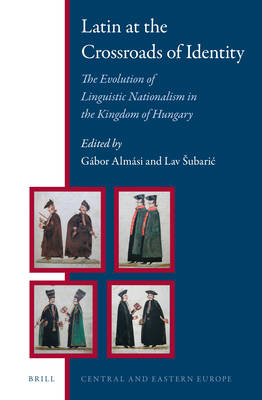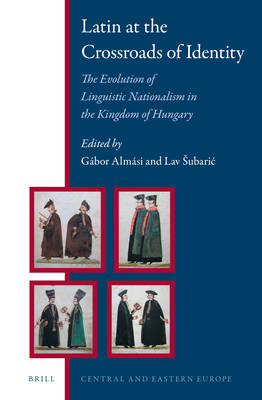
Je cadeautjes zeker op tijd in huis hebben voor de feestdagen? Kom langs in onze winkels en vind het perfecte geschenk!
- Afhalen na 1 uur in een winkel met voorraad
- Gratis thuislevering in België vanaf € 30
- Ruim aanbod met 7 miljoen producten
Je cadeautjes zeker op tijd in huis hebben voor de feestdagen? Kom langs in onze winkels en vind het perfecte geschenk!
- Afhalen na 1 uur in een winkel met voorraad
- Gratis thuislevering in België vanaf € 30
- Ruim aanbod met 7 miljoen producten
Zoeken
Latin at the Crossroads of Identity
The Evolution of Linguistic Nationalism in the Kingdom of Hungary
Gábor Almási, Lav Subaric
€ 286,95
+ 573 punten
Omschrijving
From the late 18th century in the multi-ethnic Kingdom of Hungary, new language-based national identities came to dominate over those that had previously been constructed on legal, territorial, or historical basis. While the Hungarian language struggled to emancipate itself, the roles and functions of Latin (the official language until 1844) were changing dramatically. Latin held a different significance for varying segments of society, from being the essential part of an individual identity to representing an obstacle to "national survival"; from guaranteeing harmony between the different linguistic communities to hindering change, social and political justice. This pioneering volume aims to highlight the ways language debates about Latin and Hungarian contributed to the creation of new identities and ideologies in Central Europe.
Contributors include Gábor Almási, Per Pippin Aspaas, Piroska Balogh, Henrik Hönich, László Kontler, István Margócsy, Alexander Maxwell, Ambrus Miskolczy, Levente Nagy, Nenad Ristovic, Andrea Seidler, Teodora Shek Brnardic, Zvjezdana Sikiric Assouline, and Lav Subaric
Contributors include Gábor Almási, Per Pippin Aspaas, Piroska Balogh, Henrik Hönich, László Kontler, István Margócsy, Alexander Maxwell, Ambrus Miskolczy, Levente Nagy, Nenad Ristovic, Andrea Seidler, Teodora Shek Brnardic, Zvjezdana Sikiric Assouline, and Lav Subaric
Specificaties
Betrokkenen
- Auteur(s):
- Uitgeverij:
Inhoud
- Aantal bladzijden:
- 326
- Taal:
- Engels
- Reeks:
- Reeksnummer:
- nr. 5
Eigenschappen
- Productcode (EAN):
- 9789004300170
- Verschijningsdatum:
- 24/07/2015
- Uitvoering:
- Hardcover
- Formaat:
- Genaaid
- Afmetingen:
- 163 mm x 241 mm
- Gewicht:
- 662 g

Alleen bij Standaard Boekhandel
+ 573 punten op je klantenkaart van Standaard Boekhandel
Beoordelingen
We publiceren alleen reviews die voldoen aan de voorwaarden voor reviews. Bekijk onze voorwaarden voor reviews.









